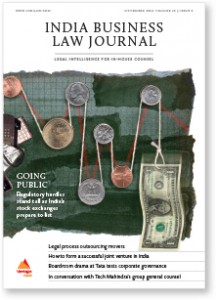AThe surprise withdrawal of 86% of the total value of currency in circulation in India began just as the results of the elections in the US began trickling in. The two events have triggered unprecedented consternation and disruption while serving also as reminders of the wisdom of factoring in every eventuality and outcome. The jury is out on how both events will unfold in the weeks and months ahead, however, the question remains whether we are reaping what we have sown.

This month’s Cover story focuses on another area where India is charting a new course. The Bombay Stock Exchange and National Stock Exchange are gearing up to list themselves and while this will provide an exit route for existing investors there are crucial legal and regulatory challenges, not least because Indian regulations do not allow stock exchanges to list on their own exchange. As Manan Lahoty, a partner at Luthra & Luthra, points out, “there could be a potential conflict of interest, because you will be regulated by your competitor”. We will know over the next few months whether the two exchanges will actually subject themselves to such a listing.
Happenings over the past few weeks at Tata Sons have allowed competitors and ordinary people alike to take a peep into the inner workings of this most revered company. Yet these battles are not new and in Falling out of favour we analyse the legalities of such boardroom dramas. Under Indian law, how secure is the tenure of the chairman of a board? What defines a successful boardroom coup? Are board members’ roles interchangeable? Important questions that affect due process and the credibility of corporate governance. As Ramanand Mundkur, at Mundkur Law Partners, says: “You have to follow the process and cannot just interchange the roles and rights of the chairman with those of the director.”
Some of this may be familiar to veteran in-house lawyers such as Atanu Sarkar, group general counsel at Tech Mahindra. Sarkar who spent four years as a trial court lawyer before starting his in-house career at a small Tata company, Tata Robins Fraser, spoke recently to India Business Law Journal editor Vandana Chatlani on his early life and what it means to be an in-house lawyer. “A GC needs to understand their company and its culture to help retain and build the character of the organization. That’s the role we must play … the extensive global interaction and footprint of in-house lawyers today makes them global ambassadors of the profession”, says Sarkar. Lofty ideals that will no doubt inform and inspire many.
In this month’s What’s the deal? we provide tips on launching a successful joint venture in India. While the sheer detail and complexity of paperwork when forming a company in India or registering for tax and related purposes often surprises foreign parties, it is important to recognize that joint ventures are fundamentally welcome in India and can be rewarding for both domestic and foreign companies.
Writing in this month’s Vantage point Parveen Mahtani argues that although the recently enacted Real Estate (Regulation and Development) Act, 2016, is a significant move towards ensuring consumer protection and standardizing business practices in the real estate sector, it will require work to plug loopholes. Among other things, Mahtani, an experienced in-house lawyer, believes the new act by expanding the definition of a promoter will trigger changes in the structuring of investments and a rethink by independent directors on the board of such companies.
This month’s Intelligence report turns the spotlight on six leading companies that provide technology-enabled solutions for the legal industry, which over the past decade has been transformed particularly in developed jurisdictions. Our focus is on Clutch Group, Integreon, Mindcrest, Pangea3 (now Thomson Reuters Legal Managed Services), QuisLex and UnitedLex. All are companies that have operations in India and have individually pushed the boundaries of the legal industry.
With the advent of robot lawyers, technology is widely acknowledged to be the current driver of change. Ten years ago this space was occupied by the legal process outsourcing (LPO) industry, and while the companies named above began as LPO providers, today they pride themselves on being providers of technology-enabled solutions – essentially legal solutions delivered on a technology platform. With this, the transformation of the legal industry has taken on a new dimension – one that will no doubt take many fascinating twists and turns.



























